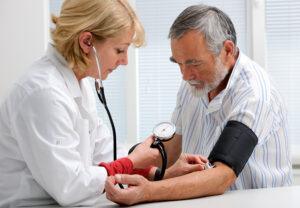Hyperthyroidism: the Risks, Symptoms and Causes in the Elderly

Elder Care Encino CA
 Thyroid disease have no age limit, but can be very serious in the elderly.
Thyroid disease have no age limit, but can be very serious in the elderly.
The thyroid gland is located in the base of your aging parent or elderly loved one’s neck just below the Adam’s apple. Even though it is relatively small, it influences function of many important organs: heart, liver, brain, skin and kidney, for example.
One of the risk factors of thyroid disease in the elderly is family history, especially of a close family member like a brother, sister or child. When it comes to elder care, it is important that your loved one’s home care provider understand the causes, symptoms and risks associated with thyroid disease and your elderly loved one.
What is hyperthyroidism?
Hyperthyroidism is excessive production of thyroid hormone by their thyroid glands and is often misdiagnosed in the elderly.
Hyperthyroidism in the elderly
Hyperthyroidism is excessive production of thyroid hormone by their thyroid glands and is often misdiagnosed in the elderly.
Know the risks
An important clue to the presence of thyroid disease in an elderly patient is a history of thyroid disease in another close family member such as a brother, sister or child of the patient.
Know the causes
Some causes of hyperthyroidism can include:
Graves’s disease
Grave’s disease is an autoimmune disorder that causes the development of swelling of the muscles and other tissues around the eyes.
Toxic Multinodular Goiter
Toxic multinodular goiter is a goiter is abnormal enlargement of the thyroid gland. When multiple nodules in the thyroid produces excessive thyroid hormone it affects a person’s heart rhythm.
Toxic nodule
A toxic nodule is a single nodule or lump in the thyroid that produces more thyroid hormone than the body requires.
Know the symptoms
Symptoms of thyroid disease varies depending on the type of the thyroid disorder. The symptoms for hyperthyroidism in the elderly include:
- Fast heart rate
- Feeling anxious or irritable
- Trembling hands
- Unexplained weight loss
- Inability to tolerate warm temperatures
- Hair loss
- Fingernails separating from the nail bed
- Muscle weakness
- Loose and frequent bowel movements
- Protrusion of the eyes
- Irregular heart rate
- Accelerated loss of calcium from bones
- Increase bowel movements
- Excessive perspiration
Always consult a doctor if your parent or loved one exhibits any of these symptoms and you are concerned.
